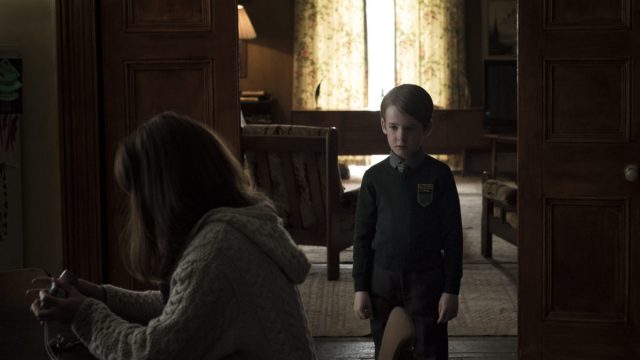The Hole in the Ground: Slan Slan, by David Bax

This review originally ran as a part of our Sundance 2019 coverage.
It’s become increasingly apparent that not only is Jennifer Kent’s The Babadook one of the best horror movies of the decade, it’s also one of the most influential. Schlock like Stacy Title’s The Bye Bye Man was an early example, having lifted bits of Kent’s mythology and character design. But now, five years after The Babadook‘s premiere, more substantive examples of the movie’s legacy are popping up. One of the first of these (along with Nicholas McCarthy’s forthcoming The Prodigy) is Lee Cronin’s The Hole in the Ground, another story that explodes everyday parental anxieties–like if it’s okay to take a sleeping pill for some much deserved rest when you’re a single mother who needs to be alert–into full-fledged horror. Such questions, though, pale in comparison to Cronin’s biggest one: What happens when your growing boy turns into someone you no longer recognize?
Seána Kerslake is Sarah, a young mother who has left both her husband and her old life behind to start anew with her son, Chris (James Quinn Markey), in a small town. When Chris begins behaving oddly, though, Sarah wonders if she’s just seeing him processing a bevy of sudden changes or if he has fallen prey to something very old and sinister rumored to be lurking in the woods just outside their new home.
As genre entries go, The Hole in the Ground operates within mostly recognizable genre tropes, to only sporadically effective results. The flickering basement lightbulb, for instance, has long since lost its ability to engender fear. On the other hand, the use of negative space in a frame that forces us to anticipate what might suddenly be seen there is a horror mainstay for damned good reasons. And, for what it’s worth, a crazy old lady standing in the middle of the road is no less unsettling for how familiar it feels.
What The Hole in the Ground may lack in originality, though, it makes up for in specificity. It’s a thoroughly Irish movie (well, except for the presence of stellar Scottish character actor James Cosmo), the kind that feels no need to explain the covered mirrors at a wake.
Cosmo, as the only survivor of a family decimated by the local evil, has the movie’s defining monologue, about the way things change slowly and then all at once, like pebbles rolling down a hill that become a landslide. Ultimately, The Hole in the Ground is unable to fulfill the promise of that allegory. In an overly drawn out final act, it abandons its own mystery in favor of run of the mill monster movie shenanigans. This time, though, it’s unable to bring anything new to the clichés.






























